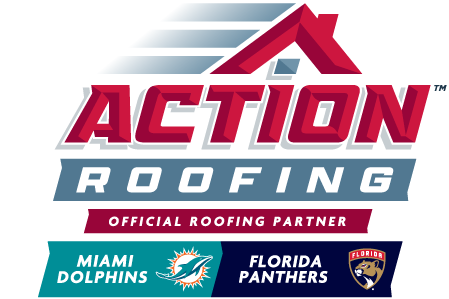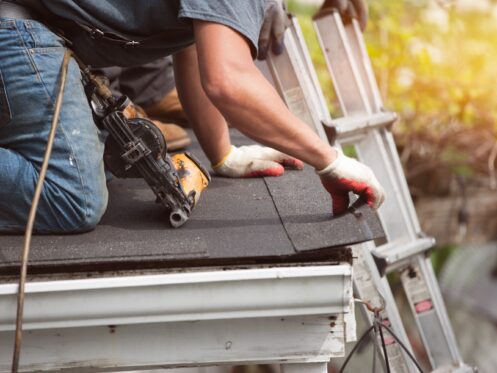Florida’s climate can be both beautiful and brutal, making roof repairs tricky to schedule. The weather ranges from sudden downpours to scorching temperatures. Throw in hurricanes for good measure, and what we’re left with is a climate that can leave us guessing a good part of the year. Homeowners need to be proactive and strategic when scheduling any roofing work. Knowing the best tactics for planning roof repairs can save time, money, and stress.
What Are Florida’s Seasons?
Florida experiences two primary weather seasons. The hot, rainy, and humid season runs from May through October, with the Atlantic hurricane season from June 1 to November 30. The dry season is from October through May.
What Time of Year Is Best for Roof Repairs in Florida?
Your best bet for scheduling roof repairs is from December through April, after the rainy/hurricane seasons have passed. During this period, there will be less concern about the weather disrupting the process.
How Does Weather Affect Roof Repair Scheduling?
The state’s unpredictable weather, especially during the rainy season, plays a major role in how and when roof repairs happen. Florida roofers are used to working in unpleasant conditions, especially in the heat and humidity, but we always put their safety first. It’s unsafe for roofers to work in severe weather, such as hurricanes. Our team strives to complete every project as scheduled, but unfortunately, inclement weather can interrupt plans.
What Happens if Weather Delays My Scheduled Roof Repair?
We always watch the weather forecast closely to stay prepared and proactive. Customer satisfaction is a top priority, so if the weather delays your scheduled roof repair, we’ll work with you to create a plan for moving forward. We’ll keep you informed every step of the way.
Should I Schedule Roof Repairs During Hurricane Season?
We recommend scheduling roof repairs during the dry season, if possible. The weather conditions are ideal, with less risk of disruptions. Hurricane season brings unpredictable weather, which means the potential for appointment delays and postponements. However, if your roof has experienced severe damage, such as significant leaks, at any time of the year, call us immediately so that we can help.
How Far in Advance Should I Schedule Roof Repairs?
Ideally, you’ll schedule roof repairs as soon as you know you need them. Appointments can book up fast, especially during the dry season, as many homeowners know it’s the optimal time to get them done. Making an appointment in advance gives you the best chance of securing a date and time that’s ideal for your schedule. It also decreases the chances of the roofing problem worsening in the meantime.
How Soon Should I Schedule a Roof Repair Once I Notice Damage?
Contact us right away if you notice (or suspect there might be) any roof damage. We can do an inspection and work fast to address the situation, whether performing an immediate roof repair or doing a temporary fix that can hold over if inclement weather is in the forecast.
Can I Put Off Scheduling Minor Repairs?
Putting off minor roof repairs might be tempting, especially if there are no visible leaks. However, small issues can easily and quickly develop into severe damage, especially during hurricane season, when heavy rains and high winds can make things worse. Non-urgent repairs might not need same-day attention, but it’s still important to get on our schedule so that we can evaluate your roof’s condition as soon as possible. Our team can assess the severity of the issue, determine the risk of increasing damage, and come up with a plan to make the necessary repairs.
What Are the Risks of Waiting Too Long to Schedule Roof Repairs?
Delaying roof repairs can be risky because damage tends to worsen the longer it goes unaddressed. Even minor roof problems can compromise your home’s structural integrity. The greater the deterioration, the more complex and costly it is to fix.
When a minor issue turns severe, it usually increases the required repair time. What we initially might have been able to fix in an hour or two could suddenly take a day or more. This might not seem like a big deal during the dry season, but it certainly can be during the wet season when rain can occur seemingly out of nowhere. The less time the damage is left exposed to the elements, the better.
What Are the Advantages of Scheduling Repairs During Florida’s Dry Season?
Florida’s dry season has more predictable weather compared to the rainy season. There’s less risk of storms disrupting roof repairs or delaying or postponing the appointment. It also allows more time to address roofing issues and complete repairs before the rainy season starts.
The biggest perk of getting all your roofing repairs done during the dry season is the peace of mind you get to experience. Destructive storms can happen at any time of the year, but you can feel confident that your roof is better prepared to handle the inclement weather.
Can Inspections Prevent Severe Roof Damage?
Regular roof inspections are one of the most effective ways to prevent severe damage. Roof issues typically worsen in Florida’s intense heat, humidity, and storms. The sooner professional roofers can fix these problems, the better. An inspection allows our roofers to spot issues you may not even be aware of, such as curling shingles or moss that’s starting to grow.
How Do I Know I Need Roof Repairs?
Our professional roofing company can advise you during an inspection if you need roof repairs. We recommend scheduling an annual appointment, preferably during the dry season.
Self-inspections are another way to determine if you need repairs. However, doing them safely is important, which doesn’t mean climbing on the roof.
Do them while the sun is out at least twice a week. Stand at ground level and view your roof from the front, back, and sides. You can use binoculars to safely get a closer view. Check out your roof the day after a storm to make sure there’s no damage. Don’t forget to inspect your attic even if you didn’t see any external problems. Signs you may need roof repairs include noticing missing shingles, finding your roof material in the yard, seeing leaks from your attic ceiling, and spotting sunlight through a ceiling hole.
How Can I Prevent Roof Damage During Hurricane Season?
Checking your gutters and downspouts is a great way to prevent roof damage during hurricane season. Make sure they’re properly secured to avoid high winds ripping them off. They also shouldn’t be clogged with debris. Rainwater can back up underneath your roofing material and into your home.
Additionally, it’s crucial to have a landscaper trim any overhanging branches. High winds can easily knock them down right onto or through your roof.
Don’t let roof damage put your home and belongings at risk. Action Roofing in Pompano Beach, FL performs high-quality roof repairs and inspections to prepare your house for the state’s severe storms. Contact us today to schedule an appointment.




